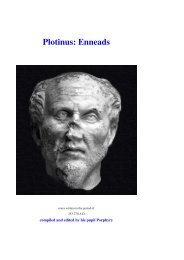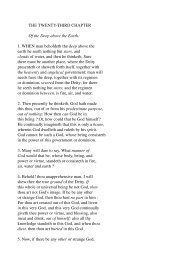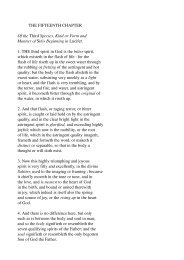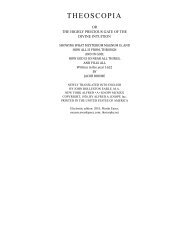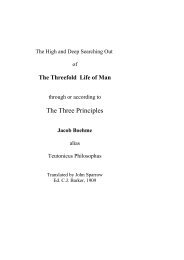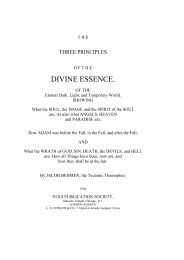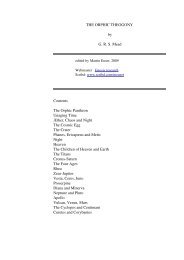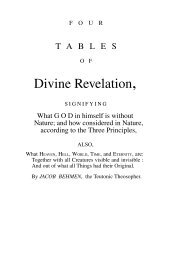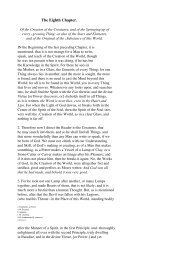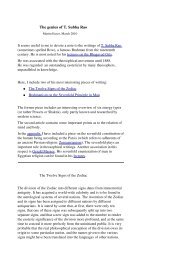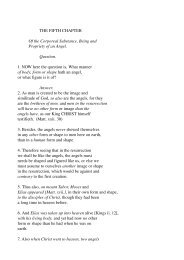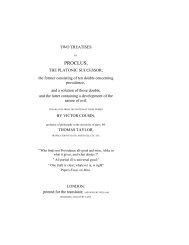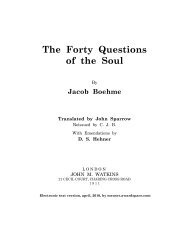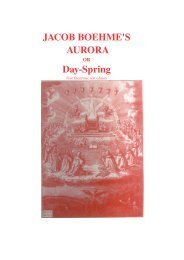Gerald Massey's Lectures - Society in evolution - Awardspace
Gerald Massey's Lectures - Society in evolution - Awardspace
Gerald Massey's Lectures - Society in evolution - Awardspace
Create successful ePaper yourself
Turn your PDF publications into a flip-book with our unique Google optimized e-Paper software.
myths were anciently <strong>in</strong>terpreted.<br />
Accord<strong>in</strong>g to the Persian reckon<strong>in</strong>g, the human creature was formed as the sixth creation,<br />
or, as the Hebrew version has it, on the sixth day; whereas <strong>in</strong> the version of the Seventy<br />
man was created on the eighth day. Now, if we look closely at the first chapter of<br />
Genesis, we shall f<strong>in</strong>d both these reckon<strong>in</strong>gs comb<strong>in</strong>ed, but not blended. Although there<br />
are no more than six days of creation mentioned <strong>in</strong> the Hebrew Genesis, there are eight<br />
dist<strong>in</strong>ct acts of creation or utterances of the Word. These are enumerated as follows:--<br />
(1) The Elohim said--"Let there be light."<br />
(2) The Elohim said--"Let there be a firmament."<br />
(3) The Elohim said--"Let the waters be gathered together,"<br />
* * * and--"let the dry land appear."<br />
(4) The Elohim said--"Let the earth put forth grass."<br />
(5) The Elohim said--"Let there be light <strong>in</strong> the firmament."<br />
(6) The Elohim said--"Let the waters br<strong>in</strong>g forth."<br />
(7) The Elohim said--"Let the earth br<strong>in</strong>g forth."<br />
(8) The Elohim said--"Let us make man <strong>in</strong> our image."<br />
The Bundahish has six creations only. The eight are Egypto-Gnostic, <strong>in</strong> keep<strong>in</strong>g with the<br />
Ogdoad of primary powers. Accord<strong>in</strong>g to the Gnostics, who had preserved the only true<br />
knowledge of these mythical matters, man, as the eighth creation, belongs to the mystery<br />
of the Ogdoad. Irenæus tells us how the Gnostics ma<strong>in</strong>ta<strong>in</strong>ed that man was formed on the<br />
eighth day of creation: "Sometimes they say he was made on the sixth, and at others on<br />
the eighth day." (B. 1, C. 18, 2)<br />
These two creations of man on the sixth day and on the eighth were those of the Adamic<br />
or fleshly man and of the spiritual man, who were known to Paul and the Gnostics as the<br />
first and second Adam, the man of earth and the man from heaven. Irenæus also says they<br />
<strong>in</strong>sisted that Moses began with the Ogdoad of the Seven Powers and their Mother, who is<br />
called Sophia (the old Kefa of Egypt, who is the "Liv<strong>in</strong>g Word" at Ombos). Thus we f<strong>in</strong>d<br />
the two systems are run <strong>in</strong>to each other, and left without the means of dist<strong>in</strong>guish<strong>in</strong>g the<br />
one from the other, or of know<strong>in</strong>g how they had either of them orig<strong>in</strong>ated. So that,<br />
<strong>in</strong>stead of a revelation of the beg<strong>in</strong>n<strong>in</strong>g <strong>in</strong> the Hebrew Genesis, we have to go far beyond<br />
it to f<strong>in</strong>d any beg<strong>in</strong>n<strong>in</strong>g whatever.<br />
So it is with the Fall. Here, as before, the Genesis does not beg<strong>in</strong> at the beg<strong>in</strong>n<strong>in</strong>g. There<br />
was an earlier Fall than that of the Primal Pair. In this, the number of those who failed<br />
and fell was seven. We meet with these Seven <strong>in</strong> Egypt--(Eight with the Mother)--where<br />
they are called the "Children of Inertness," who were cast out from "Am-Smen," the<br />
Paradise of the Eight; also, <strong>in</strong> a Babylonian legend of creation, as the Seven Brethren,<br />
who were Seven K<strong>in</strong>gs; like the Seven K<strong>in</strong>gs <strong>in</strong> the Book of Revelation; and the Seven<br />
Non-Sentient Powers, who became the Seven Rebel Angels that made war <strong>in</strong> Heaven.<br />
The Seven Kronidæ, described as the Seven Watchers, who, <strong>in</strong> the beg<strong>in</strong>n<strong>in</strong>g, were<br />
formed <strong>in</strong> the <strong>in</strong>terior of heaven. The heaven, like a vault, they extended or hollowed out;<br />
that which was not visible they raised, and that which had no exit they opened; their work<br />
of creation be<strong>in</strong>g exactly identical with that of the Elohim <strong>in</strong> the Book of Genesis. These<br />
are the Seven elemental powers of space, who were cont<strong>in</strong>ued as Seven timekeepers. It is<br />
said of them, "In watch<strong>in</strong>g was their office, but among the stars of heaven their watch<br />
they kept not," and their failure was the Fall. In the Book of Enoch the same Seven<br />
watchers <strong>in</strong> heaven are stars which transgressed the commandment of God before their<br />
time arrived, for they came not <strong>in</strong> their proper season, therefore was he offended with<br />
them, and bound them until the period of the consummation of their crimes, at the end of<br />
the secret, or great year of the world--i.e., the Period of Precession, when there was to be<br />
the restoration and re-beg<strong>in</strong>n<strong>in</strong>g. The Seven deposed constellations are seen by Enoch,



